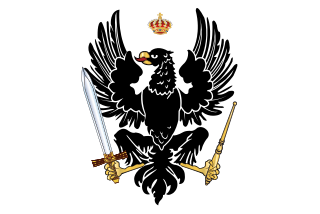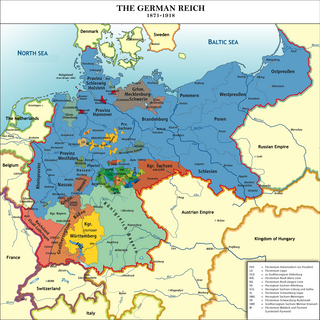Related Research Articles

The German Empire, also referred to as Imperial Germany, the Kaiserreich, the Second Reich, as well as simply Germany, was the period of the German Reich from the unification of Germany in 1871 until the November Revolution in 1918, when the German Reich changed its form of government from a monarchy to a republic.

Otto, Prince of Bismarck, Count of Bismarck-Schönhausen, Duke of Lauenburg, born Otto Eduard Leopold von Bismarck, was a conservative German statesman and diplomat. From his origins in the upper class of Junker landowners, Bismarck rose rapidly in Prussian politics, and from 1862 to 1890 he was the minister president and foreign minister of Prussia. Before his rise to the executive, he was the Prussian ambassador to Russia and France and served in both houses of the Prussian Parliament. He masterminded the unification of Germany in 1871 and served as the first Chancellor of the German Empire until 1890, in which capacity he dominated European affairs. He had served as the chancellor of the North German Confederation from 1867 to 1871, alongside his responsibilities in the Kingdom of Prussia. He cooperated with King Wilhelm I of Prussia to unify the various German states, a partnership that would last for the rest of Wilhelm's life. The King granted Bismarck the titles of Count of Bismarck-Schönhausen in 1865 and Prince of Bismarck in 1871. Bismarck provoked three short, decisive wars against Denmark, Austria, and France. Following the victory against Austria, he abolished the supranational German Confederation and instead formed the North German Confederation as the first German national state, aligning the smaller North German states behind Prussia, while excluding Austria. Receiving the support of the independent South German states in the Confederation's defeat of France, he formed the German Empire – which also excluded Austria – and united Germany.

The German Confederation was an association of 39 predominantly German-speaking sovereign states in Central Europe. It was created by the Congress of Vienna in 1815 as a replacement of the former Holy Roman Empire, which had been dissolved in 1806.

The German Democratic Party was a centre-left liberal party in the Weimar Republic. Along with the German People's Party, it represented political liberalism in Germany between 1918 and 1933. It was formed in 1918 from the Progressive People's Party and the liberal wing of the National Liberal Party.

The North German Confederation was a German confederated state that existed from July 1867 to December 1870. It is the first period of the German nation state, which is known today as the Federal Republic of Germany.
Kulturkampf was the conflict that took place from 1872 to 1878 between the government of Prussia led by Otto von Bismarck and the Roman Catholic Church led by Pope Pius IX. The main issues were clerical control of education and ecclesiastical appointments. A unique feature of Kulturkampf, compared to other struggles between the state and the Catholic Church in other countries, was Prussia's anti-Polish component. By extension the term Kulturkampf is sometimes used to describe any conflict between secular and religious authorities or deeply opposing values, beliefs between sizable factions within a nation, community, or other group.

Prussia was a German state on the southeast coast of the Baltic Sea. It formed the German Empire under Prussian rule when it united the German states in 1871. It was de facto dissolved by an emergency decree transferring powers of the Prussian government to German Chancellor Franz von Papen in 1932 and de jure by an Allied decree in 1947. For centuries, the House of Hohenzollern ruled Prussia, expanding its size with the Prussian Army. Prussia, with its capital at Königsberg and then, when it became the Kingdom of Prussia in 1701, Berlin, decisively shaped the history of Germany.

The National Liberal Party was a liberal party of the North German Confederation and the German Empire which flourished between 1867 and 1918.
The Progressive People's Party was a social liberal party of the late German Empire.
The Free Conservative Party was a liberal-conservative political party in Prussia and the German Empire which emerged from the Prussian Conservative Party in the Prussian Landtag in 1866. In the federal elections to the Reichstag parliament from 1871, it ran as the German Reich Party. DRP was classified as centrist or centre-right by political standards at the time, and it also put forward the slogan "conservative progress".
This article aims to give a historical outline of liberalism in Germany. The liberal parties dealt with in the timeline below are, largely, those which received sufficient support at one time or another to have been represented in parliament. Not all parties so included, however, necessarily labeled themselves "liberal". The sign ⇒ denotes another party in that scheme.
This article gives an overview of liberalism in the Czech lands. It is limited to liberal parties with substantial support, mainly proved by having had a representation in parliament. The sign ⇒ denotes another party in that scheme. For inclusion in this scheme it is not necessary that parties label themselves as a liberal party.

The unification of Germany into the German Empire, a Prussian-dominated nation state with federal features, officially occurred on 18 January 1871 at the Palace of Versailles in France. Princes of most of the German-speaking states gathered there to proclaim King Wilhelm I of Prussia as German Emperor during the Franco-Prussian War.

Radicalism or classical radicalism was a historical political movement representing the leftward flank of liberalism during the late 18th and early 19th centuries and a precursor to social liberalism, social democracy and modern progressivism. Its earliest beginnings were found in Great Britain with the Levellers during the English Civil War, and the later Radical Whigs.
The German Progress Party was the first modern political party in Germany, founded by liberal members of the Prussian House of Representatives in 1861 in opposition to Minister President Otto von Bismarck.
The German Free-minded Party or German Radical Party was a short-lived liberal party in the German Empire, founded on 5 March 1884 as a result of the merger of the German Progress Party and the Liberal Union, an 1880 split-off of the National Liberal Party.
The Saxon People's Party was a left-liberal and radical democratic party with socialist leanings in Germany, founded by Wilhelm Liebknecht and August Bebel on 19 August 1866 in Chemnitz, and integrated into the newly-founded Social Democratic Workers' Party (SDAP) on 8 August 1869. It was an alliance between liberal, anti-Prussian bourgeois and socialist workers' organizations in Saxony. It is considered one of the precursors to the Social Democratic Party of Germany.
National liberalism is a variant of liberalism, combining liberal policies and issues with elements of nationalism. Historically, national liberalism has also been used in the same meaning as conservative liberalism (right-liberalism).
The Liberal Union was a short-lived liberal party in the German Empire. It originated in 1880 as a break-away from the National Liberal Party and is therefore also called Secession. It merged with the left liberal German Progress Party to form the German Free-minded Party in 1884.
The Free-minded Union or Radical Union was a liberal party in the German Empire that existed from 1893 to 1910.
References
- ↑ Winkler, Jürgen R. (1995). Sozialstruktur, politische Traditionen und Liberalismus. Eine empirische Längsschnittstudie zur Wahlentwicklung in Deutschland, 1871–1933. Springer. p. 66.
- ↑ Stargardt, Nicholas (1994). The German Idea of Militarism: Radical and Socialist Critics 1866-1914. Cambridge University Press. p. 31.
- ↑ Sperber, Jonathan (1997). The Kaiser's Voters: Electors and Elections in Imperial Germany . Cambridge University Press. p. 164.